Educational Activities
Physical Education (PE)
To be leaders in society, first comes the need to develop a strong body. Besides PE lessons, there are plenty of other opportunities for students to develop cooperation and compassion through sports. Each grade has its own exercise times for engaging in seasonal sports, but they may also practice before lessons, during lunchtime, and after school. There are also a number of extra-curricular activities to train the body and mind, such as a mini-marathon on the school trip to the beach for fourth-year students, and mountain climbing during the school trip to the highland for fourth- and fifth-year students.
-
- Spring
- In the spring, students run short distances, relays, and long distances on the schoolyard. A large Japanese keyaki tree, a rare sight in the city, stands in the middle of the field and provides shade for students.
-
- Summer
- Summer is the perfect time for swimming, so Yochisha Elementary offers swim classes for our students. The aim of these lessons is to teach students water safety and how to stay safe in a crisis. All students are expected to complete a 1000m swim by the time they graduate. This is more than just PE benchmark—it is a way to teach students how to take on tough challenges, and an opportunity to reshape their relationship with water. This can give them confidence and an enriched appreciation for the role of water in the ecosystem. In addition to the 1000m swim, they also learn how to help themselves and others by practicing water safety, swimming while fully-clothed, and other water rescue methods.
-
- Autumn
- Autumn is a busy time for the school, with sports day, physical fitness tests and related school programs. On sports day, the pupils take part in races, relays, games with students from different homeroom classes, and dancing. From their third year onwards, students play dodgeball, kickball, softball, soccer, basketball, and volleyball in sports competitions within Yochisha against students from other classes in their grades. Students learn how to play fair, developing both mentally and physically through these activities.
-
- Winter
- Every morning in the winter, the whole school takes part in running and jump rope exercises, trying to break their previous records. Students learn the joy of doing things with friends that would be hard to achieve on their own. While it is often difficult to improve at jump rope and other exercises, breaking the record leads to a great sense of achievement. This illustrates the wisdom behind the words of former Keio University President Shinzo Koizumi, “Practice makes the impossible possible.”
Clubs
There are many clubs at Yochisha. Clubs become available from the fifth year and meet once a week. Yochisha has a tradition that teachers can start a new club to make the most of their own skills and interests. This has resulted in a wide range of clubs being established. Besides rugby, baseball, tennis, drama, and instrumental music, we also have lacrosse and climbing—a rarity among primary schools. The sports clubs focus on developing individual skills and practicing for sports competitions with other private schools, while the cultural clubs work toward presenting their work at the school performance day. There are also several other extra-curricular activities, and some clubs go on training camps during the summer holidays.
Clubs are an important opportunity for students to interact with their peers from different classes and grades. Through these activities, students can appreciate their classmates’ strengths, which are not always on display in normal classroom settings and can help each other to develop those strengths even further. It is also an opportunity for the sixth-year students to learn how to behave as good role models to the new fifth-year students who have just joined the clubs, and to be aware of their responsibilities as the most senior members of the clubs.
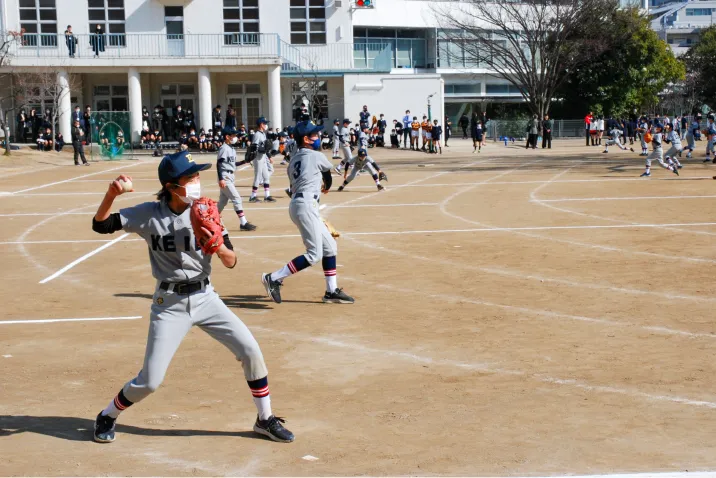
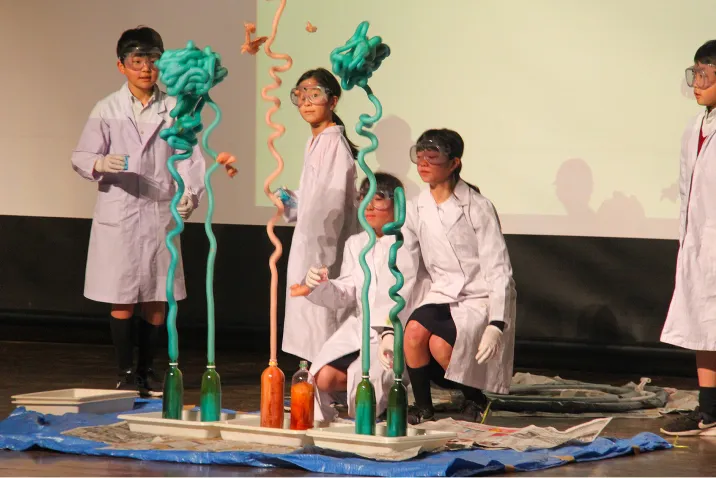
List of Clubs
- [ Sports Clubs and Physical Activity ]
-
- Badminton Club
- Baseball Club
- Basketball Club
- Climbing Club
- Dance Club
- Golf Club
- Gymnastics Club
- Kendo Club
- Lacrosse Club
- Martial Arts Club
- Rugby Club
- Running Club
- Soccer Club
- Table Tennis Club
- Tennis Club
- Wilderness Club
- [ Culture Clubs ]
-
- Architecture Club
- Art Appreciation Club
- Art Club
- Choir Club
- Computer Club
- Craft Club
- Drama Club
- Home Economics Club
- Nature Club
- Science Club
- Subculture Club
- Tea Ceremony Club
- Traditional Games Club
Student Activities
Extra-curricular activities are the perfect example of encouraging students to take “the next step” and take initiative to provide services that aid the school and their classmates. Many of these activities are organized by committee. For example, the members of the Class Committee make up the slogans for the UNICEF campaign, and go around calling out to students at morning assemblies and in the classrooms of the lower years. In addition, the Environmental Problems Committee (EPC) was created in response to the children’s own request to recycle milk cartons and plastic bottle tops.
To inform the whole school of the decisions made by these committees, we hold a monthly morning assembly for student activities, where each committee can report on their progress. This special assembly is broadcast on the school’s television network, which is hosted
by the Broadcasting Committee (YNS), with the Computer Committee in charge of the video cameras. In this way, the children can better appreciate that these activities are organized by them and for them.
There are many other activities that put an emphasis on student initiative. The signboards displayed at the school gate for sports day, the art exhibition, and the school performance day are based on students’ designs. We also have an open table tennis tournament in April, a New Year’s card game in January, a kanji reading contest at the end of February, and an open tennis tournament in March. These are all optional, respecting each student’s individual decision on whether to take up these challenges.
This is how we encourage initiative and proactiveness in all of our students, through spontaneous and independent activities that teach skills which can be applied in various situations.
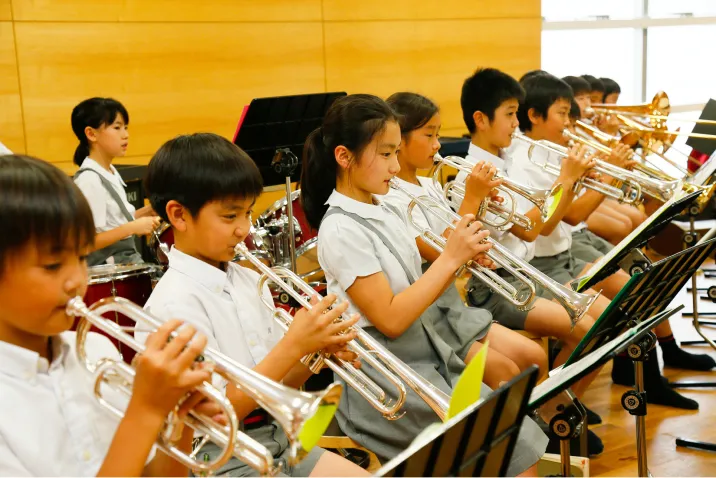
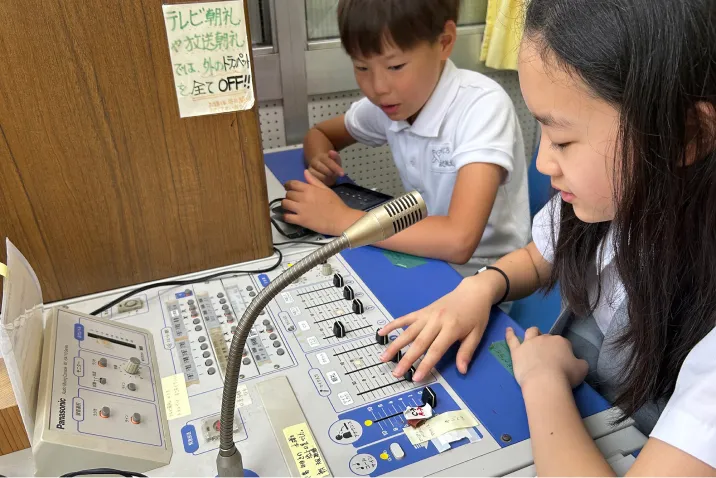
Student Activities
-
- Class Committee
- Garden Society
- Computer Committee
- Creature Caretakers
- Music Committee
-
- Sports Committee
- Broadcasting Committee (YNS)
- Brass Band
- School Enrichment Society
-
- Library and Materials Committee (LAM)
- Lunch Etiquette Society
- Environmental Problems Committee (EPC)
- Science Museum Assistants (SMA)
International Exchange Programs
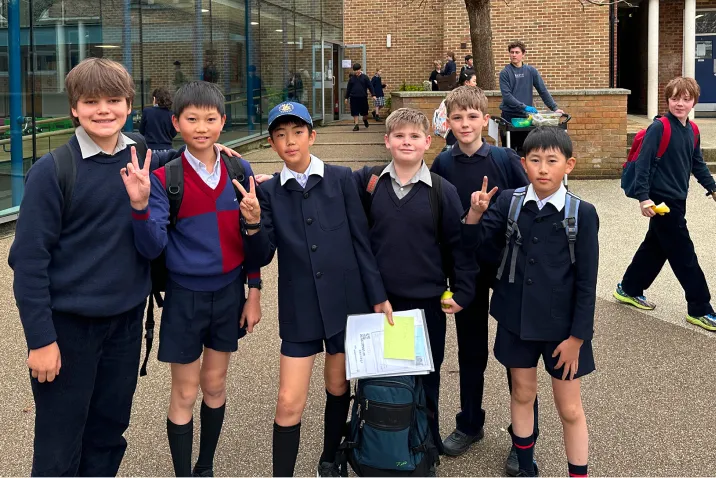
We offer four international exchange programs.
The first is with the Dragon School in Oxford, England, which began in 1995 and which will be celebrating its 30th anniversary in 2025. Every spring, around twelve sixth-year students visit England to stay with Dragon School families and join their classes. In turn, every autumn, Dragon School students visit Japan, staying with families from Yochisha Elementary.
The second program is the Mohawk Day Camp which is held outside New York City in the United States for fourth- through sixth-year students. They stay at a dormitory at the Keio Academy of New York, and enjoy various activities with the local children.
In the third program, held at the end of August, a group of sixth-year students go to England for our Summer School Camp. We split students into four small groups of eight, each taught by a British teacher, and provide them the opportunity to study English both in the classroom during excursions in the real world.
The fourth is an exchange program with Punahou School in Hawaii for fifth-year students. Students visit each other’s schools and are placed with families from the local school where they attend classes. Through international exchange programs like this, we invest not only in our students’ foreign language skills, but also in their knowledge and experience of different cultures.
Through these international exchange programs, students are not only able to learn about other languages but also different cultures.
